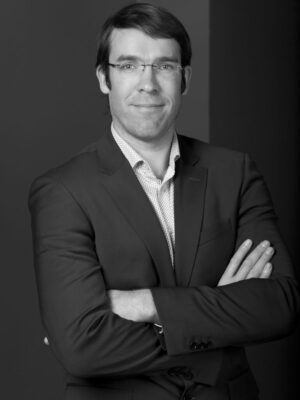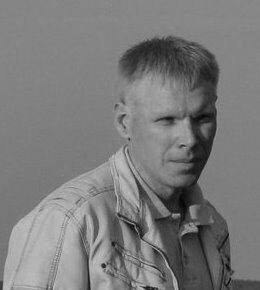Workshops
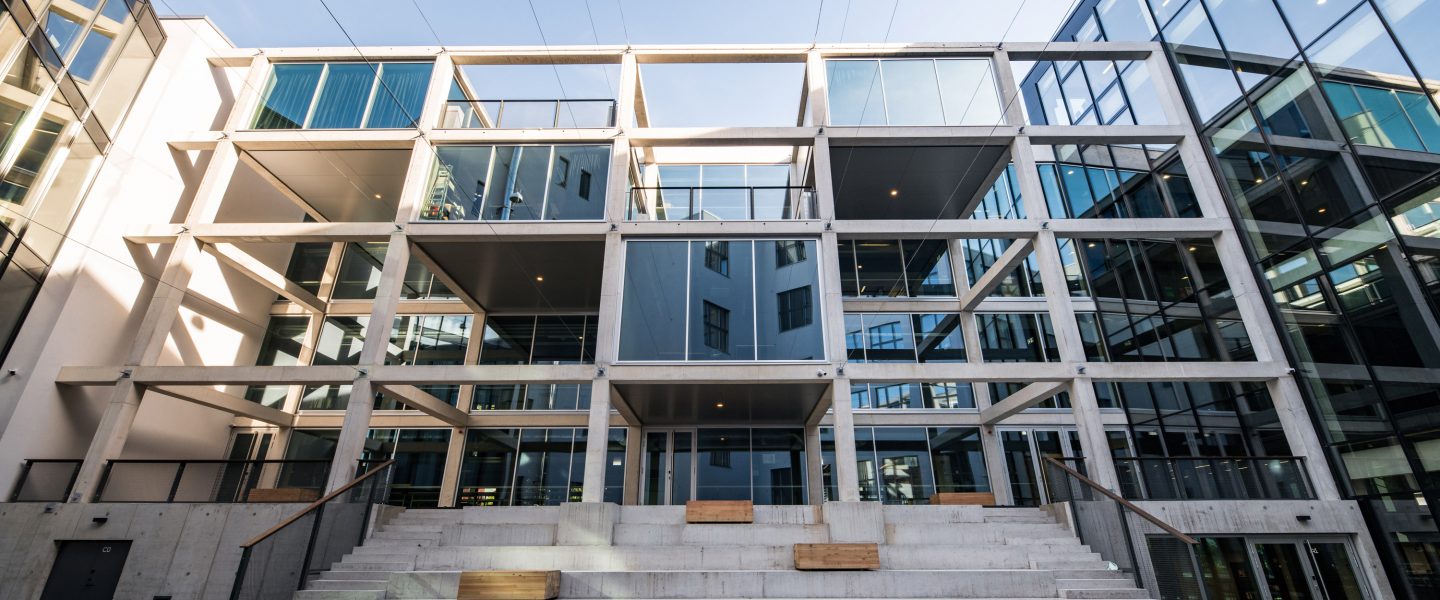
The new EKA building boasts a large number of workshops equipped with the latest technology and equipment. Photo: Tõnu Tunnel
Technical Equipment Rental D101
Equipment rental offers a variety of professional equipment for EKA students and staff for a symbolic fee in order to implement their creative and educational ideas.
In order to rent equipment, please visit the website laenutus.artun.ee and select the necessary equipment from the list or alternatively send your request via email laenutus@artun.ee.
The stock of equipment is constantly changing and there is no guarantee that the desired items will be available.
List of equipment: laenutus.artun.ee
The rental is located on the 1st floor in room D101 (just next to the library).
The rental is open on Mondays, Wednesdays and Fridays
10am – 3pm
More information:
Gregor Taaniel Kornav
+372 611 9015
laenutus@artun.ee
Wood and Modelling Workshop B104, B105
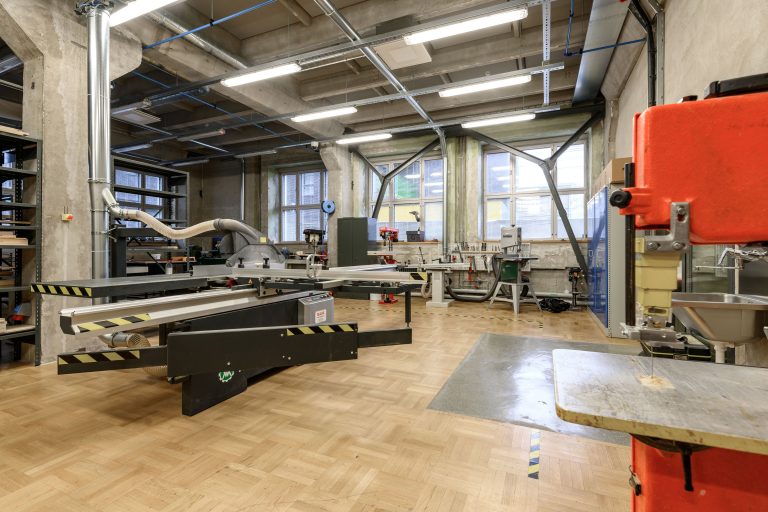
The Woodworking Shop is divided among three rooms: machinery room, a classroom furnished with workbenches, and a finishing room for painting and fashioning plastic models from various fibres.
The requirement for working in the workshop is to pass primary courses in manual techniques and safety equipment pursuant to the academic schedule or, upon agreement with an instructor, while the workshop is open.
Depending on the material, the Woodworking Shop allows for sawing, chiselling, planing, milling, boring, lathing, sanding, gluing and bending various materials laminated in a vacuum.
Open
Mon–Fri 9–17
Rules for using EKA’s modelling workshop and woodworking shop
Safety instructions for EKA’s woodworking shop’s finishing room
Safety instructions for bench drill
Safety instructions for woodturning
Safety instructions for sawing
Safety instructions for milling
Safety instructions for thicknesser
Safety instructions for planing
Instructor
Avo Tragel
Technicians
Priit Kõiv
Oliver Kanniste
Metalworking Shop B106
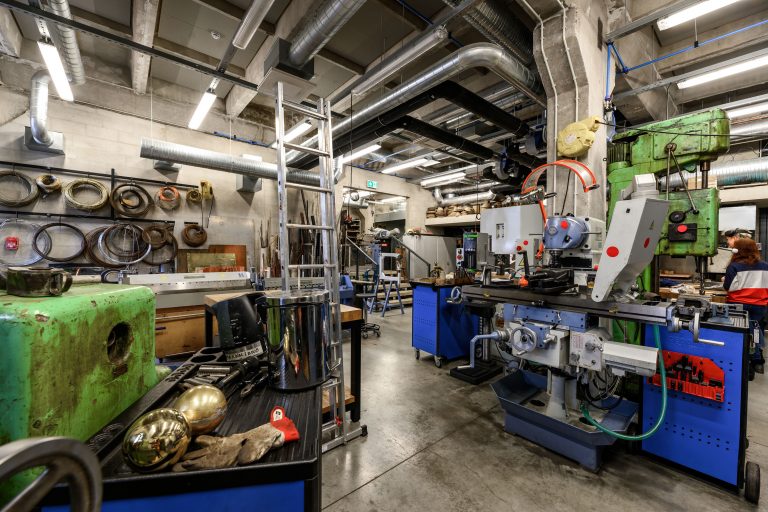
Cold-working of metals can be performed in this workshop: drilling, milling, lathing, bending, cutting.
Open
Mon, Wed 10–17.30
Tue, Thu, Fri 10–19.30
Consultations for non-curriculum students Tue, Fri 10.00–18.00 ONLY BY BOOKING IN ADVANCE: LINK
Rules of Metalworking Shops
House Rules of Metalworking Shops
Chemicals processing room
Abrasives
Head of Workshops
Taavi Teevet
Technicians
Risto Tali
Bruno Lillemets
Smithy B106.4
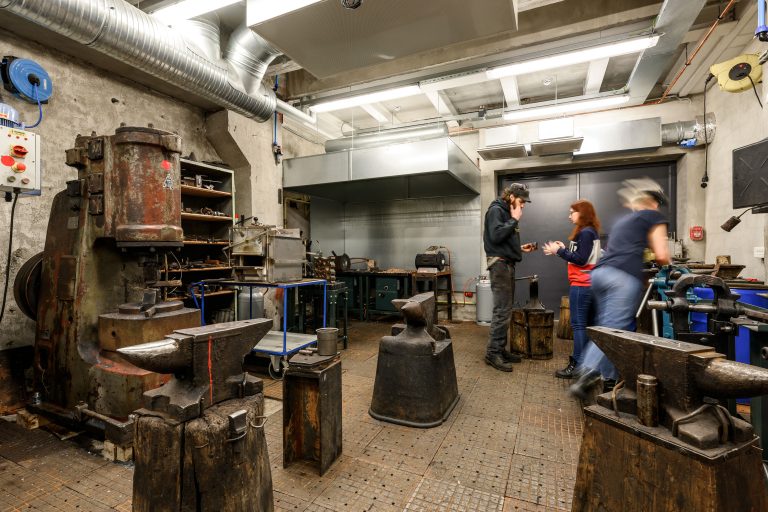
This workshop supports hot-working of iron, cutting, pressing and welding (TIG, MIG/MAG and point welding).
In the abrasion area adjoining the Smithy, cutting and polishing of metals can be performed.
Consultations for non-curriculum students Fri 10.00–18.00 ONLY BY BOOKING IN ADVANCE: LINK
Head of Workshops
Taavi Teevet
Technician
Fred Truus
Prototyping Lab B204

From 23.11.2020 we are open only when you have made booking. LINK
The Prototyping Lab hosts the 3D printers, CNC milling machines, laser cutters and electronics subjects for EKA students. While the lab is in common use, EKA students and staff can use all of the equipment and tools there for making the prototypes they need for course work.
The lab is also a R&D support unit for developing new innovative devices that EKA’s different units need to make progress in their studies. In addition, the lab can host workshops, trainings and summer university events.
The prototyping lab has a total 10 plastic 3D printers, three smaller CNC milling machines, one large CNC milling machine with a very high precision class for metal, small laser cutting machine and one laser cutting machine with a large work area. In addition, the lab has a wide selection of battery powered tools, manual tools, electronic tools and modelling equipment.
The Prototyping Lab has a card terminal for students to buy various materials such as acrylic glass, plywood, cardboards, composite materials, foam board, 3D printer filament and aluminium.
Lab Manager
Madis Kaasik
Instructor
Anna Jõgi
Sculpting Studio B206
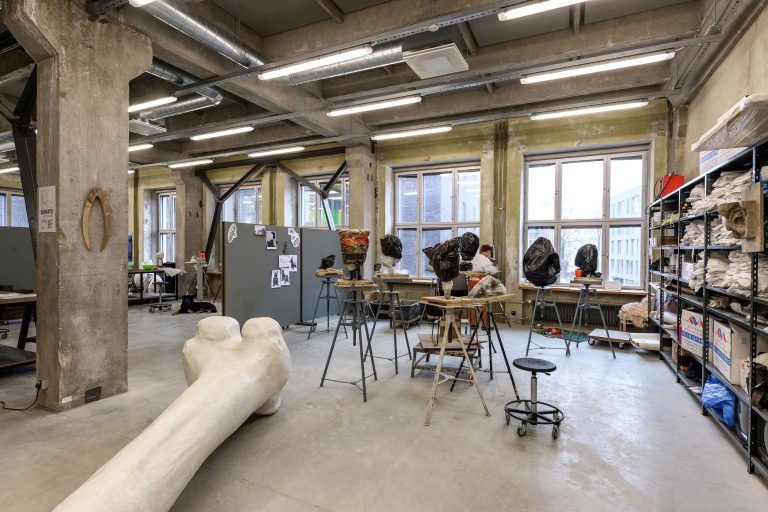
The Sculpting Studio is a venue for course work in the speciality. It is equipped with the primary manual tools needed for cutting and processing wood and metal. In addition, the studio is adjoined by a separate instructors’ room equipped with different handheld power tools that, upon agreement with the instructors, can be used on the spot. The studio can be used for modelling clay and performing other non-dust-emitting work in the speciality. The room serves as study space and meeting area for the Chair of Sculpture and Installation, hosting lessons in the speciality, independent studio work and get-togethers and assessments of creative teams.
Open
Mon–Fri 10–17
Head of Chair
Taavi Talve
Studio manager
Marko Odar
Technician
Hristina Sergejeva
Scenography Studio B304
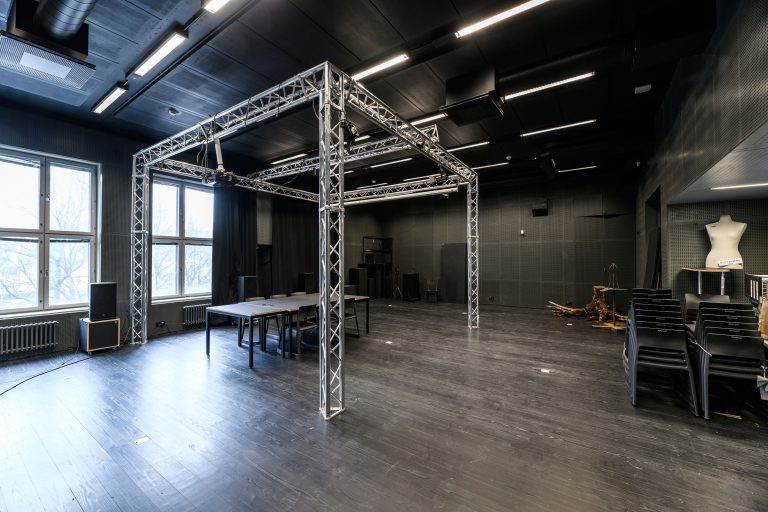
The room is a dark space with a black floor and dark gray walls. It serves as a daily workspace for various educational activities, including meetings with instructors, lectures, and other academic sessions. In the center of the room, there is a large wooden table that can accommodate at least 8 people, providing a focal point for collaborative discussions and group activities.
Temporary Head of Department
Mark Raidpere
Manager of the Figurative Thought Laboratory
Anita Kremm
New Media Sound Studio B306
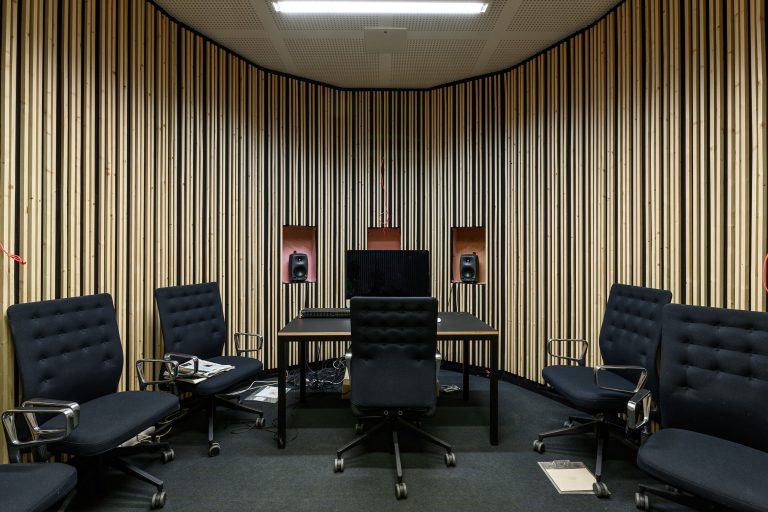
A Sound Studio is a specific room meant for professional audio work. The space is built acoustically so that walls and ceiling reflect the minimum amount of sound and the room is as insulated as possible from outside noise. Sound can be listened to over a 5.1 surround system with Genelec speakers. The studio equipment is based on a 16-track AVID S6 sound processing and mixer console controller, to which AVID MTRX and DAD AX32 analogue-digital/digital-analogue converters are hooked up. The sound is recorded and processed using ProTools HDX. There is an additional monitor for synchronizing audio for videos and films. The studio has professional Neumann and AKG microphones.
The Sound Studio is capable of doing sound editing, recording of spoken text, recording of music and soundtracks for videos and films. Recording for larger projects takes place in the Photo and Video Studio, which is electronically connected to the Sound Studio.
Use of studio is restricted to those how have passed the corresponding prerequisite course.
Head of Workshop
Hans-Gunter Lock
Digital Lab B307
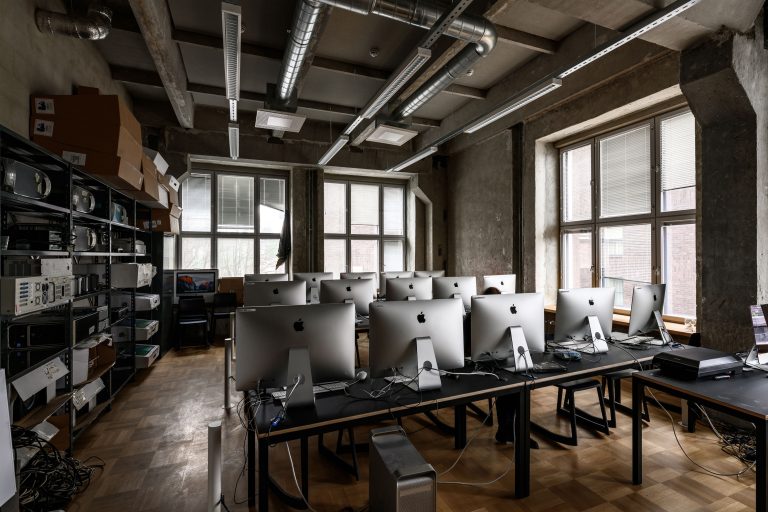
A specific digital lab tailored to the needs of the Faculty of Fine Arts is equipped for photo, video, and audio processing, 3D modeling, and more. There are 14 workstations, each equipped with Adobe CC Master Collection, and graphic tablets will soon be added. The computers also feature other specialized programs. For instructors, there is an 86” smartboard with a computer containing all the necessary software.
Additional information: it@artun.ee
Computer Lab rules:
- Do not enter the class with food or open drinks.
- The computer lab is only available for independent work during non-class hours.
- Do not bring personal devices into the computer lab.
- Do not rearrange the equipment in the computer lab.
- Report any issues to the IT department via email at it@artun.ee.
- Consult with the IT department before installing software.
- Do not store important data on the computers, as regular clean-ups are conducted.
- Keep your workstations clean and tidy.
Digital Printing Workshop D305
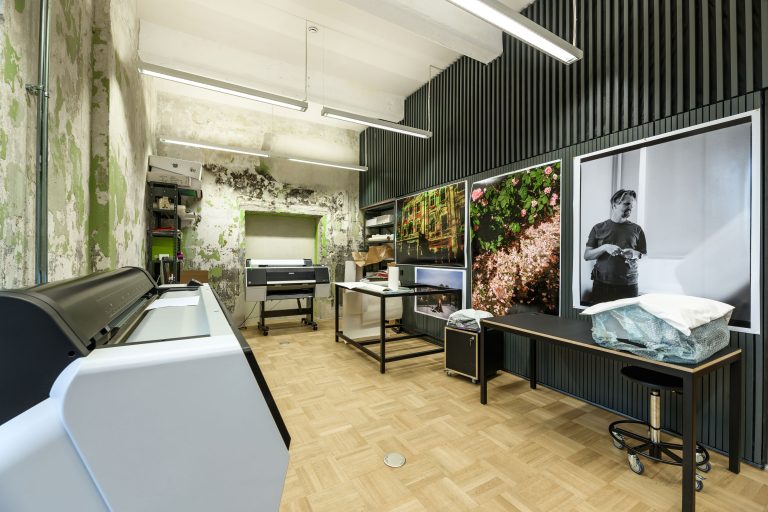
The digital darkroom offers the option of producing quality scans and printing. It has two 27” workstations, each one equipped with an Adobe CC Master Collection with graphics tablets soon to be added. The computers also have more specific programs. For scanning, there is a Hasselblad X1 scanner with a virtual drum solution and an Epson Expression 11000 A3 flatbed scanner. For printing, Epson SC-P6000 24” and SC-P9000 44” RGB printers.
(Note: Printing takes time (about 30 min/m) and costs of materials should be budgeted for (ink – about 20 €/m2 + paper). To work in the lab, book a time (at least one week in advance) with the people in charge of the facility. This is not a copy centre.
Head of Digital Printing Workshop
Tatjana Muravskaja-Loginova
Painting Conservation Studio D308
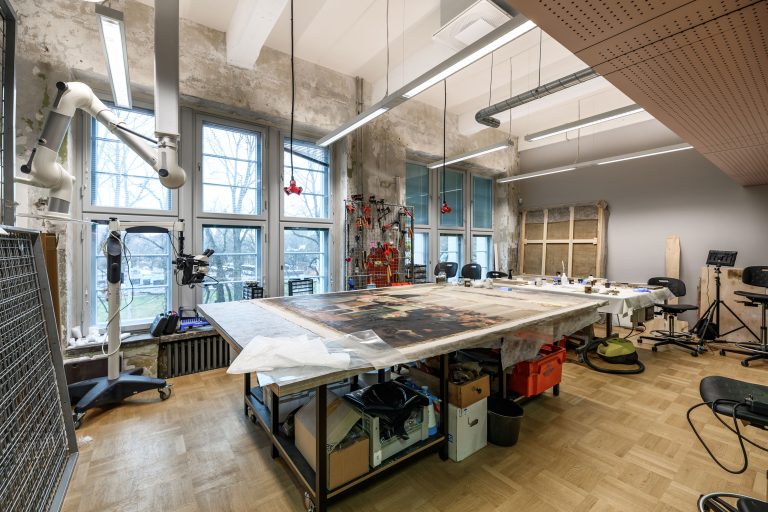
The Painting Conservation Studio provides a facility for conservation of paintings and artworks of other materials but we are also active in conducting investigations in and conserving interior paintings in buildings such as churches, manor houses and residential buildings. As regards larger equipment, the studio has stand-mounted microscopes that can be moved into position over a table and a vacuum table for flattening 2D objects and affixing paint layers. The studio is adjoined by a small Conservation Lab. The lab can be used for conducting experiments and examining, up to a magnification factor of 500, microscopic samples taken from objects.
The specialized photographic equipment allows artworks to be studied and images captured at different wavelengths of the electromagnetic spectrum (e.g. ultraviolet, infrared).
Open
Mon–Fri 10–18
Manual for working with chemicals
Head of Painting Conservation Studio
Merike Kallas
Sculpture Conservation Studio D308.2
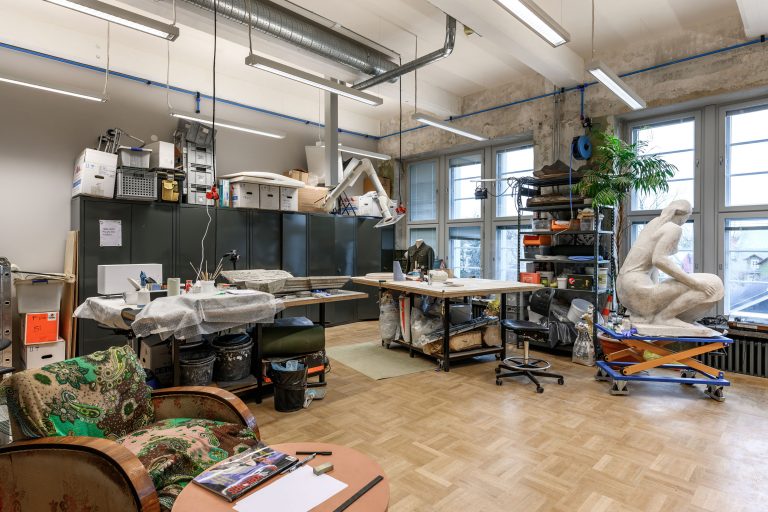
The Sculpture Conservation Studio conserves sculptures and other three-dimensional objects made of different materials. As regards major equipment, the studio offers use of a microscopes, exhaust hoods, etc. The studio has use of a lab where stratigraphic testing can be performed.
Open
Mon-Fri 10–17
Manual for working with chemicals
Technician
Taavi Tiidor
Analogue Darkroom B405
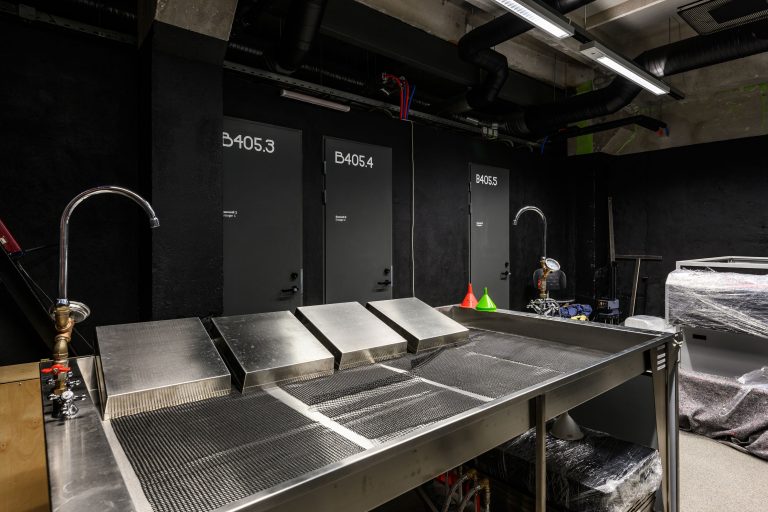
The Analogue Darkroom provides a way to develop and enlarge B&W film. It has a separate lab for developing film, five rooms with enlargers, a central facility for developing/fixing on paper, a room for drying prints and a cutting/storage room.
All enlargers have an colour head and they can enlarge off of 135 and 120 film.
The colour process uses a 80 cm Colenta RA-4 processor.
In order to use the lab, it is required to complete a course at EKA or arrange an introductory course with the head of the laboratory.
Before the first visit to the lab, make an appointment in advance by email or come by the Photo Department!
Head of the darkroom:
Kristiina Hansen
Working days: Mon, Tue
kristiina.hansen@artun.ee
Virtual Reality Lab C408
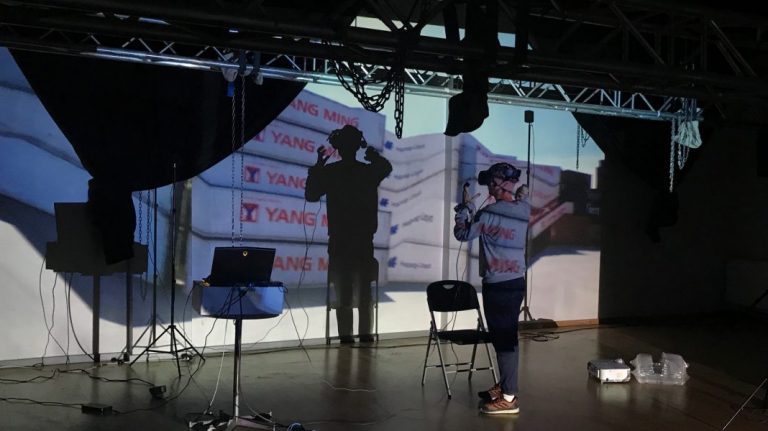
Virtual reality lab brings together the expertise on the application of virtual reality techniques in design process.
VR applications allow to design space from first persion view and pay more focus on users’ spatial experience than in case of conventional design methods. They also allow to display and experience layers of reality that are not otherwise visible, and thus expand our perceptual amplitudes. In virtual reality lab we focus on these and other qualities virtual reality techniques hold for architects and designers. Each semester we offer one intense study course that gives students an overview of immersive design and representation techniques from hand-drafted VR images to interactive VR environments. Over the course the students acquire the skillset to use game engines and other virtual reality applications as a creative medium.
Virtual reality gear:
HTC Vive Pro headsets (3x)
HTC Vive headsets (2x)
Oculus Rift (4x)
Oculus Quest (1x)
Workstations:
Dell Alienware 15 R4 portable workstations (4x)
Dell Alienware Area 51 workstation (1tk)
Opening hours Tue-Fri 13:00-18:00
In case of interest in visiting the lab, borrowing the equipment, booking a consultation, coming for a workshop or any other question please write or call.
Head of the Virtual Reality Lab
Henry Rikk
Print Workshop B409
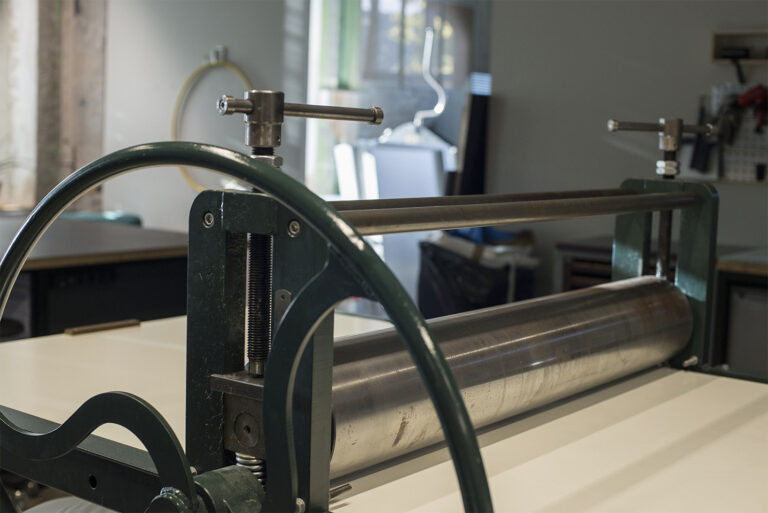
Photo: Liina Siib
The print workshop is central in the curriculum of the department of Graphic Art and functions as a main working area for the students of the department.
All traditional printmaking techniques are available at the workshop: letterpress, intaglio, lithography, block printing, and screen-printing on paper. In addition, there’s a unique collection of typefaces used in typesetting for text design and reproduction.
Workshop is equipped with A3 format Epson scanner and offers a possibility to use A3 Kyocera laser printer according to the prize list.
Students outside the department of the Graphic Art need to fill in the workshop application form in order to gain access to the print workshop.
Prize list
Equipment list
Open
Mon – Fri 10–5 pm
Head of the workshop
Maria Erikson
Technicians
Caroline Pajusaar
Paul Rannik
Mirjam Varik
3D Lab C404
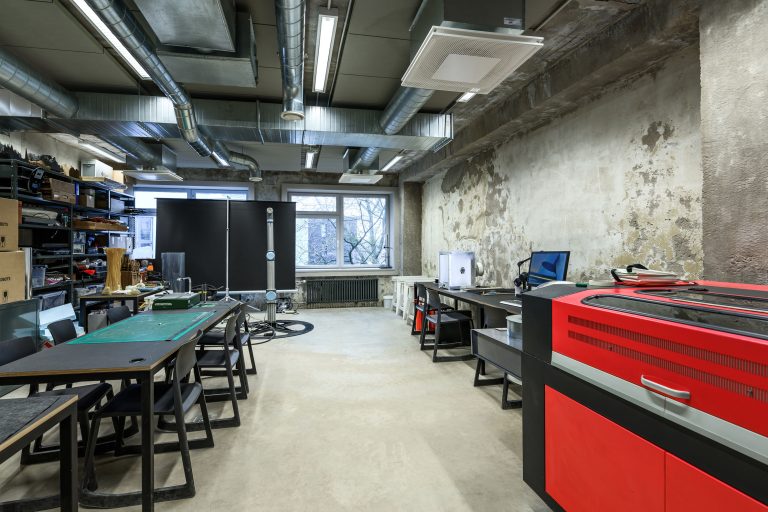
The 3D Lab (3DL) is a test lab for experimental architectural designs that applies contemporary technologies in coursework and research projects. 3DL organizes different trainings and workshops.
The main areas for 3DL are:
- Linking parametrical architecture and design with physical prototyping.
- Spatial mapping of objects in different sizes in using photogram-metry, laser distance meters and modelling.
- Linking architectural and structural parameters with databases.
- Analysis of cities and regions in connection with spatial processes and the environment.
- Mass-adaption of buildings in connection with operational and efficiency analysis.
3DL tools for prototyping and digital environment outputs into physical space:
- 100W laser cutter with an operating area of 600 × 900 mm (can be used by those who have completed training)
- Stratasys Dimension SST 768 ABS plastic 3D printer + WaterStation (by agreement with the Head of 3DL)
- Ultimaker 3+ Extended FDM 3D printer (can be used by those who have completed training)
- Universal Robots UR10 6-axis Kobot
Digitalization of 2D/3D/4D analogue/physical environment:
- Microscribe G2L 3D digitizer with an operating area of 1500 mm (can be used by those who have completed training)
- Leica Disto S910 3D and laser distance meter (can be used by those who have completed training)
- Flir E5 thermal camera (can be used by those who have completed training)
Open
Mon–Fri 10–18
Head of 3D Lab
Martin Melioranski
Textile Printing Studio D502
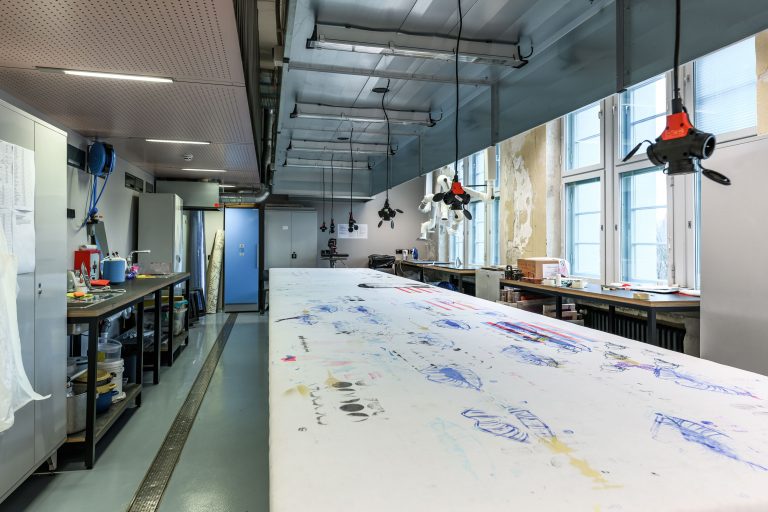
The Textile Printing Studio allows use of various fabric printing technologies – pigment printing (with special pigments – photo and thermosensitive pigments, fluorescent and reflective pigments), reserve printing, discharge and burn out printing, transfer printing, flock and foil printing, etc.). The studio enables use of a printing table (measuring 8 × 1.7 m), light table for illuminating silk-screening frames (max external measurements 100 × 124 cm) or tracing images, hot press (plate with measurements 38 × 50 cm) (for lamination, flock, foil, sublimation printing, fixing pigment dye), pressure washing equipment and exhaust hood (e.g. for mixing chemicals, drying cabinet (for drying textiles), electric stove (for heating, steaming, boiling), drying cabinet for drying printing frames.
Open
Mon–Fri 10–18
Rules for using EKA´s printing studio
Workshop Manager
Eelike Virve
Workshop Technician
Juulia Aleksandra Mikson
Knitting Studio D503
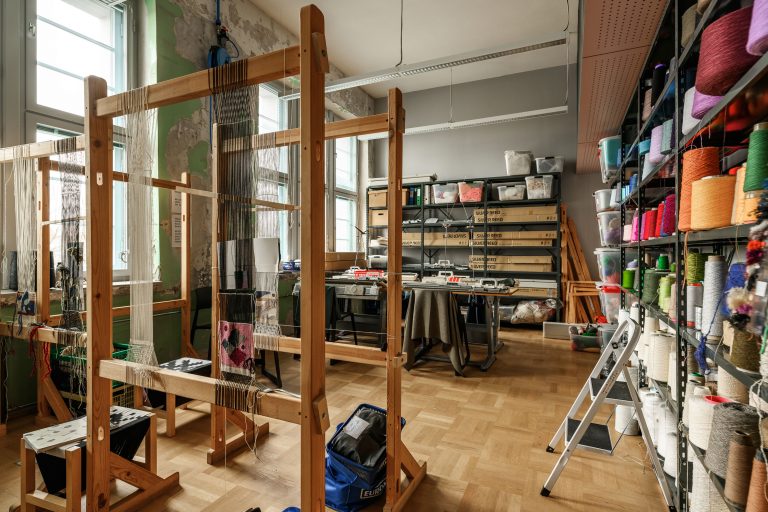
Knitting studio D503
The following knitting machines can be used in the knitting studio:
- Silver Reed SK 155 4 pcs
- Silver Reed SK 280 4 pcs
- connected to the computer Silver Reed SK 830
- It is also possible to use the tapestry frames required for the tapestry interweaving technique.
Open
Mon, Tue, Thu 9–16
Knitting and Weaving Studio Manager
Imbi Armas
You can work in the workshop during the opening hours or in agreement with the workshop instructor.
Weaving Studio D505

Weaving Studio D505
The following looms can be used in the weaving studio:
- Toika computerised Loom, with 100 cm, number of shafts 24, 2 pcs
- Toika computerised Loom, with 120 cm number of shafts 24
Toika computerised Loom, with 150 cm number of shafts 16 - Countermarch Loom, with 110 cm, number of shafts 8
- Table Looms, number of shafts 4
- Toika table Looms, number of shafts 8, 2 pcs
- Jacquard Loom TC-1 150 cm, which offers a wide range of fabric weaving options
- The fabric weaving studio is compiling a library of materials, which provides an overview of material samples created by students of the textile design department.
Textile Studio of the Future D505.1
- Yamato industrial overlok
- Brother industrial sewing machine
- Ricoma industrial embroidery machine
- Hot press
- Vacuum press
- Tools for tinning
- Felting machine
Open
Mon, Tue, Thu 9–16
Knitting and Weaving Studio Manager
Imbi Armas
Sewing Studio D507
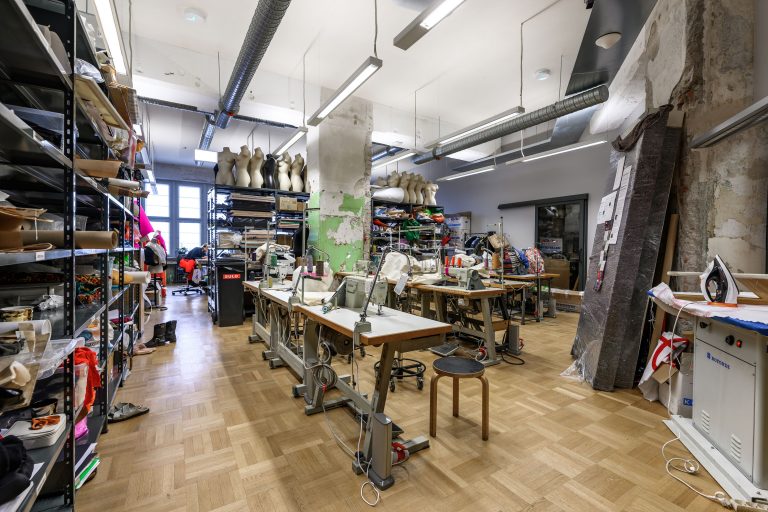
The following industrial machines for sewing textile fabrics can be used in the workshop:
Universal sewing machines for seaming, 3-thread overlock for hemming, 5-thread overlock (seaming + hemming), a cover stitch machine. We also have a buttonhole machine that makes an ordinary buttonhole. For finishing we have an iron and vacuum table. It is planned to purchase a new ironing system and an adhesive press. Two large tabletops can be used for cutting fabric.
Open
Mon–Fri 10–18
Sewing Workshop Manager
Anneli Kruusberg
Jewellery Workshop B504
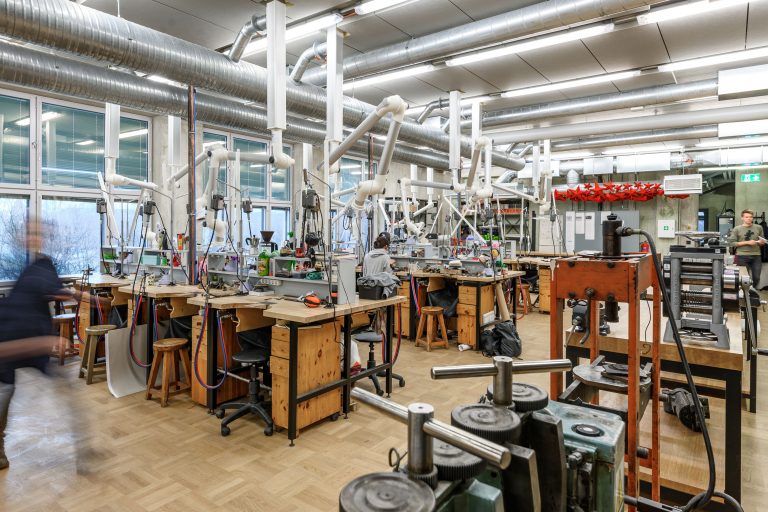
The workshop allows mainly for jewellery-making operations to be performed. There is also a hydro press and a small lathe.
Open
Mon–Fri 9–20
Goldsmiths
Kristo Pachel
Jens A. Clausen
Enamelling and Stone Cutting B506
The Enamelling and Stone Cutting room allows hot enamelling of metal (silver, copper) items and processing of precious stones (sawing, faceting, polishing) to be performed.
Open
Mon–Fri 10–17 (with advance notice)
Head of Workshops
Taavi Teevet
Lecturer
Eve Margus-Villems
Accessory Studio B510

The Accessory Studio hosts accessories-related subjects, providing basic knowledge in the technologies, materials used to make purses and bags, leather working techniques and machines. In addition, the studio hosts projects in the speciality that deal with the technologies for making headwear, gloves and footwear.
The room has three large work tables. Two workstations with Adobe software and a colour A3 printer (Epson L1300).
The studio has the following machines:
- Cylinder-bed sewing machines (Pfaff 335)
- Postbed sewing machine (Pfaff 1295)
- Cylinder-bed sewing machine (Metro Spezial 9345)
- Skiving machine (Fav AV2)
- Compressor (Herkules)
- Sole press (Lavardo NGL1)
- Rivet and buckle press
- Hot air blower
The studio has a specialized library with the latest issues of Collezioni Accessori, the latest (Brunneri) leather samples and trade fair materials. Students have six mannequin torsos and a selection of various shoe forms. Students can also purchase leather from the accessory design and bookbinding storage for use in their speciality projects.
While classes are not in session, the studio is open to students for independent work during normal working hours.
Open
Mon–Fri 10–17
Technician
Sirle Rohusaar
Bookbinding Studio B511

The Bookbinding Studio houses equipment, tools (cardboard cutter, book cutter, book presses, wire binding machine, saddle stapler, paper drill, creasing and perforating machine), adhesives and dyes necessary for working paper, paperboard and leather and binding publications. An Opus Coldcover hot press (typesetting and stereotypes) can be used for printing. There is also an option for relief printing and die-stamping.
Open
Mon–Fri 9–17
Workshop Manager
Eve Kaaret
Ceramics Workshop B602
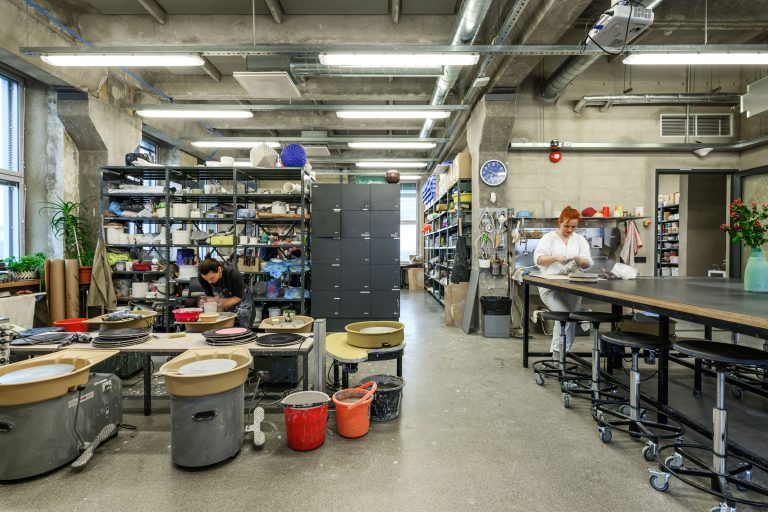
Open
Mon–Fri 9–17
Instructors
Lauri Kilusk (Tuesday, Thursday)
Jaan August Viirand (Monday, Wednesday, Friday)
Glass Workshop B604

Open
Mon–Fri 10–17
Rules for Using Glass Cold Workshop
Glass Workshop Manager
Rait Lõhmus
Technician
Eve Koha
Photo and Video Studio B404
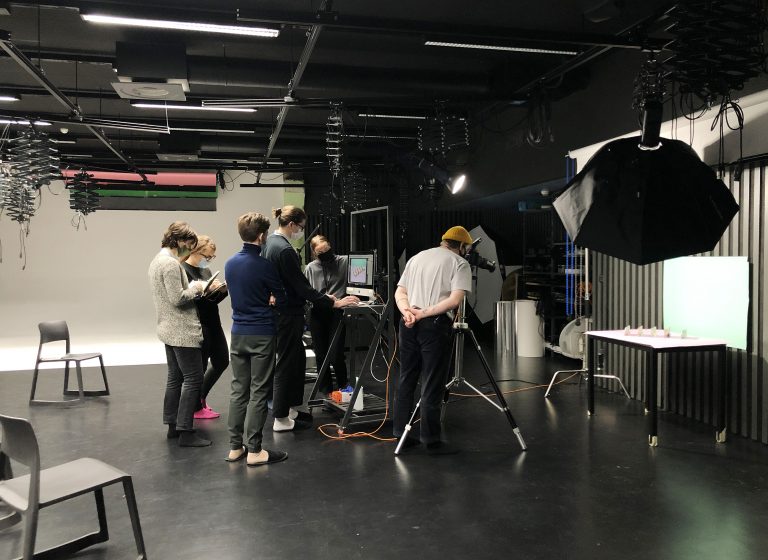
The Photo and Video Studio provides the capability to photograph and film professionally lit scenes and to record high quality audio. Available equipment includes flashes, LED panels, product photography desk, lightboxes, radius backdrop (6m width) and different tones of background papers (2.75m width).
The Studio is intended for a single smaller group, but can be split into multiple working areas as well. The space includes a dressing/make-up room for models.
Bookings in the Photo Studio must be agreed with the studio management beforehand. The allocated time for academy wide students is Thursdays 10am – 6pm.
Please be aware that it is only permitted to use the studio for school projects and assignments. There is a pricing model for commercial work and external clients.
A direct link to the Sound Studio(B306) is available to monitor and record high quality audio. This functionality needs to be agreed beforehand with the New Media department.
___
Photo Studio rules of usage
___
Photo and Video Studio assistant:
Reimo Võsa-Tangsoo
K 10-18:00
fotostuudio@artun.ee
Photo and Video Studio manager:
Madis Kurss
E, N, R 10-18:00
fotostuudio@artun.ee

